False reports incite attacks on non-Ukrainian refugees in Poland
Polish right-wing party calls for extremist groups to protect citizens from “immigrants from outside Europe.”
False reports incite attacks on non-Ukrainian refugees in Poland
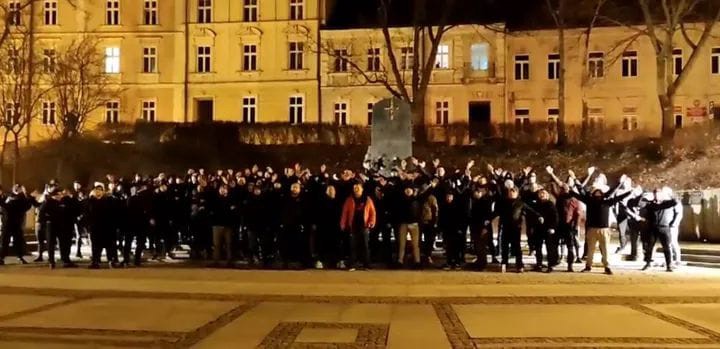
BANNER: Photo of far-right football hooligans assembling in Przemyśl on March 1 to “protect” the city from non-Ukrainian refugees. The photo was circulated on far-right Polish Facebook pages. (Source: Facebook/archive)
Amid a massive influx of refugees from Ukraine to Poland, some refugees in eastern Poland from non-Ukrainian ethnic backgrounds were physically attacked and accused of committing crimes. The campaign against non-Ukrainian refugees is supported by the Polish far-right Confederation Liberty and Independence Party, often referred to as the Confederation Party. Their leaders have endorsed the creation of a “citizens police” in eastern Poland.
On March 1, 2022, a false story appeared on social media claiming that a Polish woman was stabbed by immigrants of Middle Eastern origin who arrived in Poland from Ukraine. This information was immediately amplified by leaders of the Confederation party, who were already spreading unfounded narratives about the security risks associated with the influx of Middle Easterners arriving through Ukraine. Other rumors claimed that burglaries and rapes were occurring in eastern Poland. Prompted by these claims, dozens of Polish football “hooligans” gathered in Przemyśl to “clean” the city of undocumented people.
As Russia continues its assault on Ukraine, many Ukrainian and non-Ukrainian refugees have fled to border countries. As of March 9, six percent of the 1.3 million refugees that have crossed the Ukraine-Poland border represent nationalities other than Ukrainian or Polish. Polish police have denied claims that crime in the country had increased since February 24, when Russia’s war on Ukraine began, and warned people against circulating disinformation in Polish information spaces.
Right-wing actors promote fear of “migrants from Africa and the Middle East” entering Poland
Prior to the proliferation of the “refugees are criminals” narrative, various social media accounts and right-wing politicians in Poland exploited the influx of refugees by pushing unsubstantiated claims about “non-European economic migrants” traveling to Poland together with Ukrainian refugees. The DFRLab analyzed mentions of phrases related to non-Ukrainian refugees, such as “imigranci spoza Europy” (“immigrants outside of Europe”); “ciemnoskórych migrantów” (“dark-skinned migrants”); “nie-ukraińscy migranci” (“non-Ukrainian migrants”); and “imigranci ekonomiczni” (“economic migrants”). Mentions of these phrases online increased significantly on February 27 and reached their peak on March 1, when Polish radicals physically attacked non-European individuals in Przemyśl.
The Confederation party played a significant role in propagating these narratives. On February 27, Robert Winnicki, a Confederation party leader and member of Polish parliament, wrote about the possibility of economic immigrants from around the world taking advantage of the Ukraine-Poland corridor. On February 28, other top members of the Confederation party including Konrad Berkowicz and Krzysztof Bosak wrote that non-European economic migrants were taking advantage of the situation in Ukraine, claiming they traveled from Belarus to Ukraine to Poland.
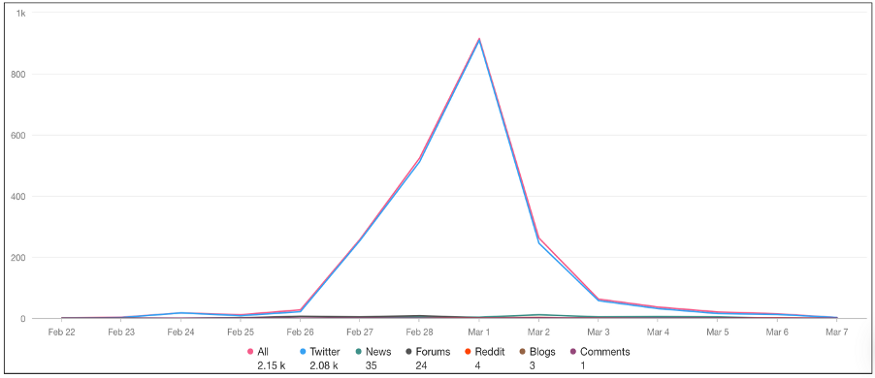
On March 1, rumors emerged that “migrants from Africa and [the] Middle East” had stabbed a young woman and looted shops in Przemyśl. After these unverified claims circulated, Confederation party leaders doubled down on pushing claims against non-Ukrainian refugees. Konrad Berkowicz wrote on Twitter, “Przemyśl is flooded with immigrants from outside Europe. They attack women.” Another party member, Wlodzimierz Skalik, wrote, “Things got dangerous in Przemyśl. Women are afraid to go out in the city because of the aggressive, colored ‘students.’ Ad hoc civic patrols were created because Polish police were useless.” Party leader Grzegorz Braun tweeted, “I support “#CitizensPatrol.” The official Twitter account of the Confederation party also retweeted a tweet from user @w_sumlinski, claiming that a group of “Arab-looking” men attacked a pregnant woman on a train from Przemyśl to Warsaw and claimed the train crew was unable to intervene. Polish railway company PKP Intercity replied to @w_sumlinski’s tweet saying that the company has not registered any such incident.
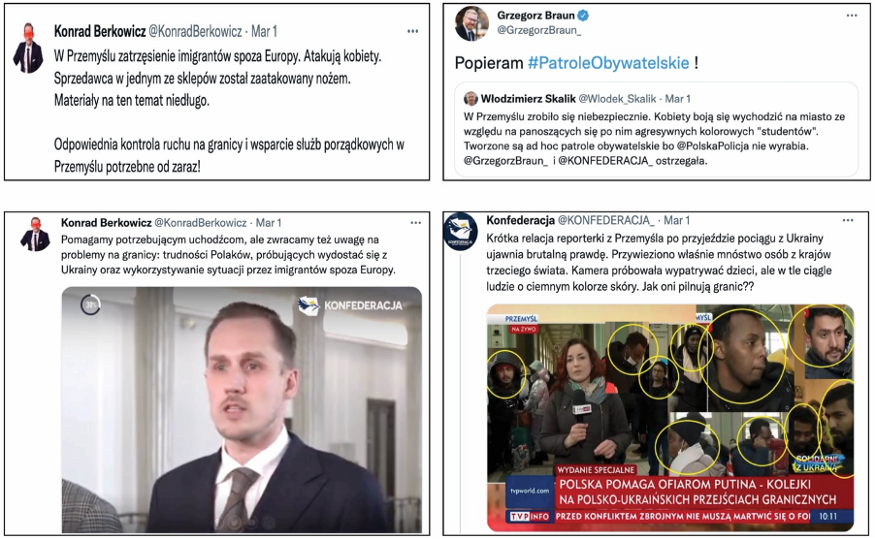
On March 1, Confederation members started a campaign on Facebook that entailed distributing a banner reading: “Attention! More and more people crossing the Polish-Ukrainian border are immigrants from outside Europe. We appeal to respective services, it is becoming increasingly difficult to help the real refugees.” The DFRLab searched for the Polish version of the phrase “immigrants from outside Europe” in CrowdTangle, a social media analysis tool, and found eighty-four posts in different Facebook groups and pages containing these keywords. These posts garnered more than 5,800 interactions between February 28 and March 5.
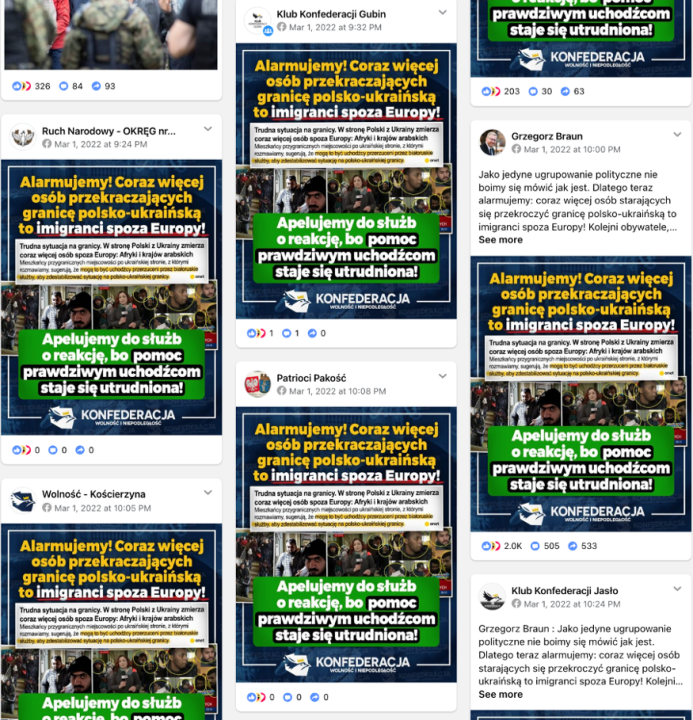
On January 5, 2022, Facebook removed Confederation’s main page, which had roughly 670,000 followers, due to hate speech and continuous COVID-19 misinformation. The DFRLab found via a CrowdTangle query that after the takedown of Confederation’s page, posts mentioning “Konfederacja” garnered higher engagements on Facebook on average than before the takedown, suggesting the removal incited a strong response from party supporters and content mentioning the party’s name still remains popular on Facebook.

Football fans attack non-Ukrainian nationals fleeing the war
Following the proliferation of false information about crimes committed by “non-Ukrainian immigrants” who came to Poland from Ukraine, at least three Indian citizens were attacked by nationalist football hooligans. The right-wing Twitter account @PrawaStronaa posted a video showing football fans chasing “dark-skin immigrants, who are attacking women in Przemyśl.” A journalist at Oko.press reported seeing a crowd of roughly one hundred masked men in Przemyśl market square on the night of the attack against the Indian nationals. Some football fan clubs in Poland are connected with far-right organisations, and have a history of committing violent acts under the pretext of defending the homeland and conservative values. Football fans also actively participate in an annual Independence Day march organized by nationalists.
On March 2, posts appeared in multiple Facebook groups stating that “economic migrants from the Middle East” had attacked a woman with a knife in Przemyśl’s Zasanie neighborhood and looted several stores. Przemyśl police said there was no record of this incident occurring. Regardless, in response to the false claims, local football fans gathered in Przemyśl to “clean up the city.” Facebook posts claimed that this vigilante behavior received tremendous approval from the local population who began to feel safe again.
A query conducted on CrowdTangle revealed that text containing the phrase “pocięciu nożem młodej kobiety” (cutting a young woman with a knife) was mentioned in thirty-six posts in public groups and pages, garnering more than 33,000 interactions between March 2–5, 2022. The majority of these posts contained an identical picture of football hooligans gathered in Przemyśl on March 1. Before the March 1 attack, some of these pages were actively posting about the influx of “economic immigrants” in Poland and unfounded allegations of criminality.
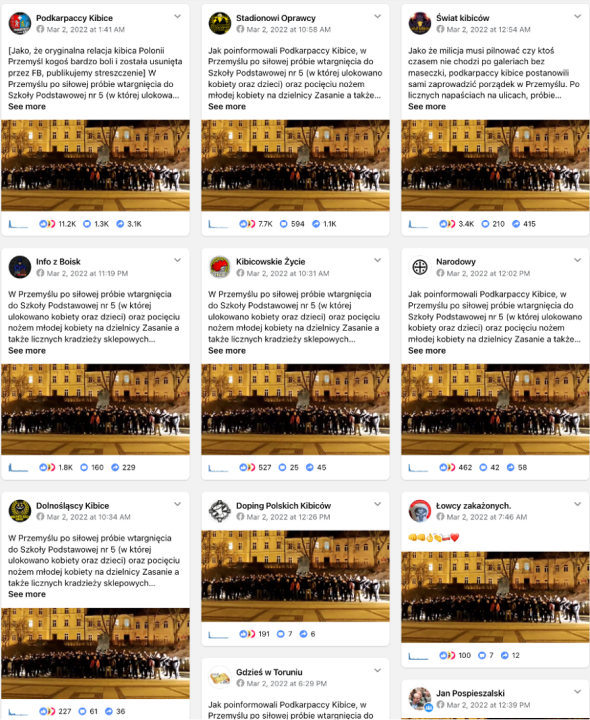
Polish authorities deny rumors about refugees committing crimes
As false stories circulated to drum up anti-immigrant fervor, Poland’s national police force said on Twitter that there is no indication that crime rates are rising near the Polish-Ukrainian border. They cautioned people against believing false information about crimes committed by refugees. On March 1, the Przemyśl Municipal office noted, “We perceive this information as typical fake news, a disinformation war aimed at limiting aid to refugees or targeting them by the inhabitants of Przemyśl.”
The police in Przemyśl reported there was no record of a young woman being attacked by a knife, adding, “We have not recorded any rape, sexual assault, theft, burglary or damage” caused by refugees. They noted one case of attempted robbery at a shop in the village of Medyka, but the shop clerk disarmed the individual and turned him over to police.
There is no indication that crime rates are rising or that newly arrived refugees are attacking Poles. Despite this, false narratives continue to circulate alleging that “non-Ukrainian refugees” are behaving violently, when in fact it is these refugees who have been the targets of violence.
Cite this case study:
Givi Gigitashvili, “False reports incite attacks on non-Ukrainian refugees in Poland,” Digital Forensic Research Lab (DFRLab), March 11, 2022, https://medium.com/dfrlab/false-reports-incite-attacks-on-non-ukrainian-refugees-in-poland-a2b549bec10a.

